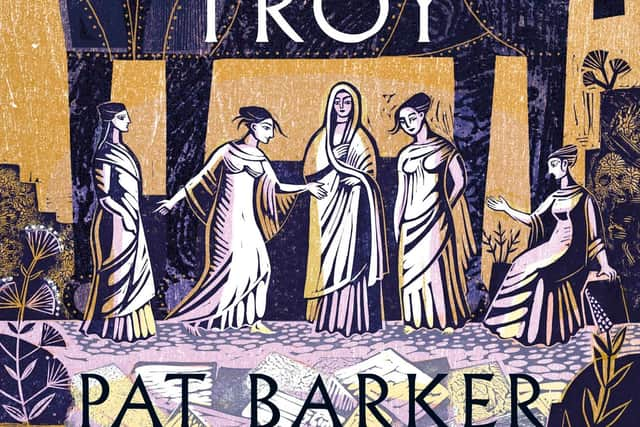Book review: The Women of Troy, by Pat Barker


The Trojan War is myth, not history, whatever basis in history it may have had. Myth is mercurial. An author can play with it, as the great tragic poets of Athens were to do. Pat Barker gave us the prologue to the war in The Silence of the Women. Her new novel might be read as its epilogue or aftermath. It begins with the wooden horse, the sack of Troy and the killing of King Priam by Achilles’ son Pyrrhus a confused, brutal, and angry young man desperate to live up to his father’s glory, even while conscious of his inferiority.
After Troy, the women are slaves, even the most fortunate held in the power of the Greeks. Briseis, once a princess, then a captive, occasion of the great quarrel between Agamemnon and Achilles, then Achilles’ wife, now his widow carrying his child and married to his lieutenant Alcimus, is one of the more fortunate. Some chapters of the novel are in her voice, others a third person narrative. Shifting the point of view in this way, without offering internal justification, is artistically clumsy, but perhaps unavoidable here, justified indeed because Briseis speaks for the women, all of whom are at the mercy of the violence of their Greek masters.
Advertisement
Hide AdThe Greeks themselves, all eager after the ten years of war to return home, are prevented by a great wind that howls through the camp day and night, never slackening. They can’t put to sea, are even victims of their triumph. Obviously they have angered the gods, but which god especially, and why?


One of the great scenes in the Iliad tells of Priam coming to the Greek camp to beg Achilles for the return of his son Hector’s body which Achilles has desecrated by dragging it round the walls of Troy. Achilles, touched by the old king’s plea, receives him as his guest and grants him his request. Now Achilles’ son has killed the aged king, desecrated his body in like manner, and refused it burial. Is this why the wind blows forbiddingly?
Even the strongest women – Hecuba the Queen, her daughter Cassandra, Andromache (Hector’s widow), Briseis herself, are all victims, subject to their conquerors, occasional acts of defiance being harshly punished. They exist in a misogynist world. Their resilience and determination to survive are remarkable.
As a novelist Barker has always looked on the world with the combination of a cold eye and a sympathetic understanding. This was evident in her great First World War trilogy, and is to be found here too. The characterisation is sharp, her sympathy deep. She extends it even to the often brutal men. Her treatment of the drunken and murdering lout Pyrrhus goes so far as granting him the prospect of reaching some mature understanding of other people, no matter how unlikely this has seemed.
The women are, as the title indicates, her central concern, and she brings their differing characters, fruits of their different experience, to life. Briseis is almost the only character who doesn’t hate and despise Helen, cause of the war and Troy’s destruction. Helen is utterly selfish, yet presented as oddly admirable in her refusal to be other than she is. She too, after all, is a victim, but one who will not consent to play that role.
Barker takes liberties, for instance giving the soothsayer Calchas a Trojan childhood. This seems permissible because the world of myth is flexible; it is excellent because it works, giving the interpreter of the gods an unexpected human background.
Advertisement
Hide AdThe atmosphere of the camp, and the conflicting interests of all the characters, the sense that men and women alike are prisoners of the moment, serving a sentence which is the inescapable consequence of all that has gone before – all this is compellingly and often beautifully conveyed.
Barker’s achievement is to have taken one of the great myths of European history, something that has permeated western culture for 3,000 years, and made something new and immediate of it. There have of course always been new stories and interpretations arising from the Trojan War; this is a very good one indeed.
Advertisement
Hide AdThe Women of Troy, Pat Barker, Hamish Hamilton, 307pp, £18.99. Pat Barker is appearing at the Edinburgh International Book Festival on 21 August
A message from the Editor:
Thank you for reading this article. We're more reliant on your support than ever as the shift in consumer habits brought about by coronavirus impacts our advertisers.
If you haven't already, please consider supporting our trusted, fact-checked journalism by taking out a digital subscription at https://www.scotsman.com/subscriptions